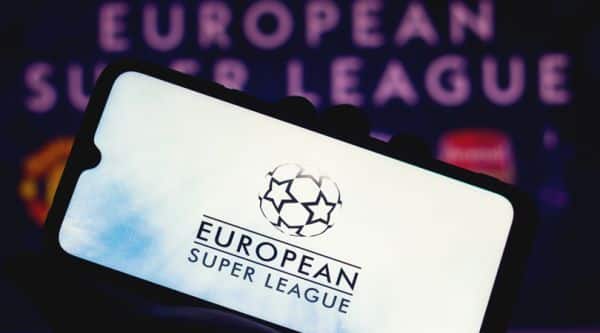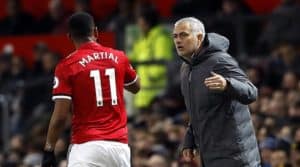One of the benefits of the European Super League, it was claimed, is that fans have much shorter attention spans these days.
Well, an entire league’s drama condensed into a two-day period of arguments and apologies certainly satisfied our modern attention spans. The Super League did not stay for long – but it burned bright.
And it took just two days to reach the knockout stage. Transfer sagas have gone on longer than this: let’s trace back this entire circus, from the very beginning, to what seems like the nail in the coffin.
Tuesday, 19 March 2019: Secret meeting to discuss possibility of Champions League reforms
The European Clubs Association meet with Uefa in Switzerland to begin a process of discussing reforms to the Champions League.
The main item on the agenda is the possibility of moving Champions League games to weekend, rather than midweek, schedules. As FourFourTwo reported at the time: ‘the dramatic moves on the agenda would start to put in place a supremacy of the European tournament over domestic leagues, and would be seen as the first steps towards a European Super League’.
We also noted that there is another ‘problem [that] is simple maths: six into four won’t go. The Premier League has six sides good enough [and, importantly, rich enough] to compete in the Champions League, but only four Champions League spots. If that sustains, they may well decide that the current system no longer works for them’.
Hold that thought.
Friday, 5 April 2019: Premier League discusses Champions League reform
Premier League teams meet to discuss new ideas that could change the way teams qualify for the Champions League.
FFT reports that this includes ‘the potential for “access lists”, that would see major clubs qualify for the Champions League even if they underperform in their domestic leagues. This would mean that finishing in the Premier League’s top four, for instance, would not necessarily mean qualifying for the following season’s Champions League’.
These discussions also feature the idea of changing the group stage, which will later become known as a ‘Swiss-style’ system (remember that, it’s important).
Tuesday, 27 October 2020: Josep Maria Bartomeu drops the bombshell
This was the first that we’d heard of this particular iteration of the Super League. The project was shrouded in secrecy from the off – but that didn’t stop outgoing Barcelona president Josep Bartomeu telling everyone that Barça had signed up for it.
The cheesed-off chief probably dropped the bombshell in a bid to stir trouble – having been ousted essentially for not cheering Lionel Messi up – and he claimed the move will guarantee ‘financial sustainability’. Everything died down for a while and we all sort of forgot about Bartomeu.
Tuesday, 9 February 2021: Uefa proposes a ‘Swiss-style’ Champions League format
All 55 member associations of Uefa dial into a two-hour conference call, chaired by the body’s president, Aleksander Ceferin. There, Ceferin tells the group of plans to increase the Champions League from 32 teams to 36, with 100 more matches in the competition for us all to enjoy.
The idea is conceived as a means to stave off a Super League, conceding a little more power to the biggest clubs in Europe. What’s really groundbreaking about these announcements, though? It introduces the concept that the Super League later runs with.
Uefa explains how some clubs will be guaranteed a qualifying place based on past performance in the new-look format, creating European Leagues president Lars-Christer Olsson calls a ‘de facto closed league’.
Not a single member association challenged the ideas brought about in this meeting. There is hope that the agreement can be finalised and announced before 20 April, with the end of March floated to revisit the plan.
Thursday, 18 February: Premier League chief attacks the idea of a Super League
The chief executive of the Premier League attacks a $6-billion plan to create a breakaway league, at the Financial Times Business of Football Summit.
Richard Masters calls the plans ‘destructive to the value of domestic football across Europe’. Cards well and truly on the table, there.
Wednesday, 31 March: Delay to Champions League reform agreement
Everything looks ready to sign off, and then … some of the bigger clubs decide they aren’t quite sure yet, with disagreements over some commercial rights cited. Having secured more matches and a qualification safety net for big teams, some apparently think they can get more.
There’s a Uefa meeting scheduled for 19 April anyway, after all. The reforms can be agreed then.
Sunday, 18 April, 2:25pm: Rumours of a Super League spring up out of nowhere
‘A Super League?’ Arsenal fans exclaimed on Twitter, ‘We’re currently losing to Fulham.’
The rumours certainly seemed to come out of the blue. We’d heard plenty of speculation about a Super League before but this seemed to come out of nowhere. Six English teams are said to be involved, but not named – not that it’s hard to guess.
Arsenal toiled away to a 1-1 draw, as Manchester United prepared to take on Burnley in the second instalment of this week’s Super Sunday.
Ole Gunnar Solksjaer is coy on the whispers after the game …
Sunday, 18 April, 6pm: Gary Neville speaks out
‘Enough is enough,’ said Gary Neville. ‘Your pyramid system that you’ve fought for, for 150 years, gone because of six clubs? Punish them, straight away. Massive fines, points deductions, take the titles off them … who cares?’
A United icon, business owner, Salford City owner and Sky Sports employee, Neville dropped all hats at once to simply speak as a football fan, becoming one of the most high-profile voices in opposition to the Super League. Fans online share his words and use his arguments as a beacon against these new proposals; others, like Neville himself, prepare to disown their clubs.
An announcement is rumoured for 9:30pm.
Sunday, 18 April, 5-9pm: More details are drip-fed from sources as more figures react
Everything is a little hazy, to begin with. JP Morgan is linked, we don’t know the exact clubs involved and apparently, Paris Saint-Germain are refusing to join out of loyalty to Uefa. Who knew?
Gradually, we start learning the ins and outs. Florentino Perez of Real Madrid has orchestrated this whole thing, with the Glazers very closely involved.
UK prime minister Boris Johnson and leader of the Labour party Sir Keir Starmer are united on Twitter in their opposition to the Super League. The European Club Association (ECA), release a statement saying it ‘strongly’ opposes the idea of a ‘closed Super League model’.
There is speculation that this is a negotiating threat ahead of the following day’s Champions League reform meeting – FFT writers aren’t so sure.
Sunday, 18 April, 11:30pm: 12 clubs announce they’re joining the Super League
OK, so this is really happening.
One by one, AC Milan, Arsenal, Atletico Madrid, Barcelona, Chelsea, Inter Milan, Juventus, Liverpool, Manchester City, Manchester United, Real Madrid and Tottenham Hotspur announce their participation in the Super League. United hold off from posting the news on Twitter, perhaps still reeling from Neville destroying them on national television.
‘Going forward, the Founding Clubs look forward to holding discussions with UEFA and FIFA to work together in partnership to deliver the best outcomes for the new League and for football as a whole,’ the media release promises. There’s talk of a women’s competition, solidarity payments and the impact of Covid-19.
The news goes down like a rattlesnake in a lucky dip with everyone.
Questions begin to arise about the obvious absentees: where are Bayern Munich, Borussia Dortmund and PSG?
Monday, 19 April, 7:30am: Fifa and Uefa issue notice of legal proceedings
We wake up to the news that Gianni Infantino and Aleksander Ceferin – who have somehow become the good guys in all of this (seriously, how?) – are looking at ways that they can legally prevent the Super League issue notice of legal proceedings in European courts designed to block any sanctions the two governing bodies might try enforce over the Super League’s formation.
Not long after this, all 12 clubs leave the ECA. Manchester United executive vice-chairman Ed Woodward and Manchester City chief executive Ferran Soriano step down from roles at Uefa. It’s going down.
Monday, 19 April, 2pm: Ceferin ramps up the offensive

The Super League is described as a ‘disgraceful, self-serving’ plan which ‘spits in the face of football lovers’, according to Uefa president Aleksander Ceferin. The Slovenian states that any Super League player will not be allowed to compete in Uefa competition, including internationals.
Gary Lineker and Alan Shearer speak out about how worried they are over the Super League, while UK culture secretary Oliver Dowden says he has ‘no choice but to formally trigger the launch of our fan-led review of football’. This seems like a disgruntled, begrudging way to announce a manifesto policy being fulfilled – but who are we to complain right now?
Meanwhile, the revamped 36-team Champions League is passed completely under the radar. Jose Mourinho’s sacking from Tottenham becomes a minor headline.
Monday, 19 April, 7pm: Liverpool face Leeds United
Elland Road becomes the scene of the first Premier League game since the Super League’s announcement. Fitting really: Liverpool boss Jurgen Klopp has spoken out in the past about the possibility of a Super League, so when he says he hasn’t changed his mind about not liking it before the game, it creates intrigue.
Leeds United players warm up in T-shirts that say ‘Earn it’, while Gary Neville and Jamie Carragher discuss the issue on ‘Monday Night Football’ all night, joined by Crystal Palace chairman Steve Parish at one point.
The game ends 1-1. Not that it matters at this point – Liverpool don’t need top four, do they?
Monday, 19 April, 9pm: Milner, Bamford and Klopp speak out
After the game, Liverpool captain for the night James Milner claims he doesn’t like the Super League and doesn’t want it to happen, while his manager, Jurgen Klopp, says that his players do not deserve to be punished. Patrick Bamford, interviewed by Sky Sports, also hits out at the plan.
‘It’s amazing the amount of uproar that comes in to the game when somebody’s pockets are being hurt,’ the Leeds striker says. ‘It’s a shame it’s not like that when all the things that go wrong with things at the minute, racism and stuff like that.’
Two hours later, Inter Miami owner and Premier League great David Beckham, posts on Instagram that football is ‘nothing without the fans’ and that competitions should be ‘based on merit’.
Tuesday, 20 April, 1am: Florentino Perez speaks
Real Madrid chief and Super League orchestrator, Florentino Perez, talks to El Chiringuito in Spain about the new competition.
‘The Super League will save the clubs financially,’ he says. ‘Football must evolve like everything in life. Football has to adapt to the times we live in now. Football is losing interest, TV rights are decreasing.’
Perez continues to suggest that maybe matches are too long to capture fans’ attention and could be shortened in the Super League, before suggesting that the way to solve the financial crisis in the sport is for this league to go ahead and for the big clubs to buy players from smaller clubs to spread the money.
Not all are impressed but the Super League does at least have fans across the world, hopeful of seeing their team play the elite every week – potentially closer to them.
Tuesday, 20 April, 9:30am to 1pm: More leaders speak up
Gianni Infantino says that Fifa ‘strongly disapproves’ of the plans, while PM Boris Johnson meets representatives from the FA, Premier League and fan groups. Downing Street gives its ‘unwavering support’ to the opposition of the Super League.
Soon enough, Marcus Rashford MBE tweets his opposition to the plans, too.
Tuesday, 20 April, 2pm: Hendo rallies the troops
Jordan Henderson of Liverpool is set to chair a meeting of the Premier League captains. It’s largely expected that if the players were to strike or revolt against the Super League, it couldn’t go through.
It looks like the future of the Premier League rests in the hands of 20 skippers. And people say being captain doesn’t mean much in modern football …
Tuesday, 20 April, 7pm: Chelsea fans protest, reports that Chelsea and Man City will pull out

Chelsea fans gather with signs and banners protesting the Blues’ participation in the Super League. Director and Chelsea legend Petr Cech goes outside to calm down the crowds at one point, in surreal scenes.
Brighton and Hove Albion, the opposition for the night, wear the T-shirts that Leeds wore the night before. Rumours begin circulating that Chelsea chairman Bruce Buck is pulling the club out of the Super League and that Manchester City could well follow suit – Pep Guardiola expressed his concerns in his media conference saying ‘it’s not sport’ when asked about a closed league.
While not publicly announced yet, it becomes clear that the two Premier League sides are indeed withdrawing.
Tuesday, 20 April, 9:20pm: Ed Woodward is gone
United’s vice-chairman, Ed Woodward, is leaving. Woodward was a major player in the formation of this whole shebang, if reports are to be believed, and was a close confidant of the Glazers.
Rumours are still abound that all English clubs are leaving. City for certain, Arsenal later on, while some claim that Chelsea simply told the crowds they were leaving to get them to disperse.
Liverpool players all tweet their opposition jointly to the Super League with the same words that James Milner used 24 hours prior. ‘We don’t want like it and we don’t want it to happen,’ comes the message. ‘This is our collective position.’
Tuesday, 20 April, 11pm: All six Premier League clubs have pulled out
Despite what Florentino Perez has claimed, the English clubs all withdraw participation from the Super League.
Rather than calm the situation, fans are still livid. Liverpool supporters tweet about wanting the Fenway Sports Group out, Man United the Glazers and Arsenal the Kroenkes. This is the end of one chapter – it’s possibly the start of another entirely …
This story orginally appeared on FourFourTwoSA.com





